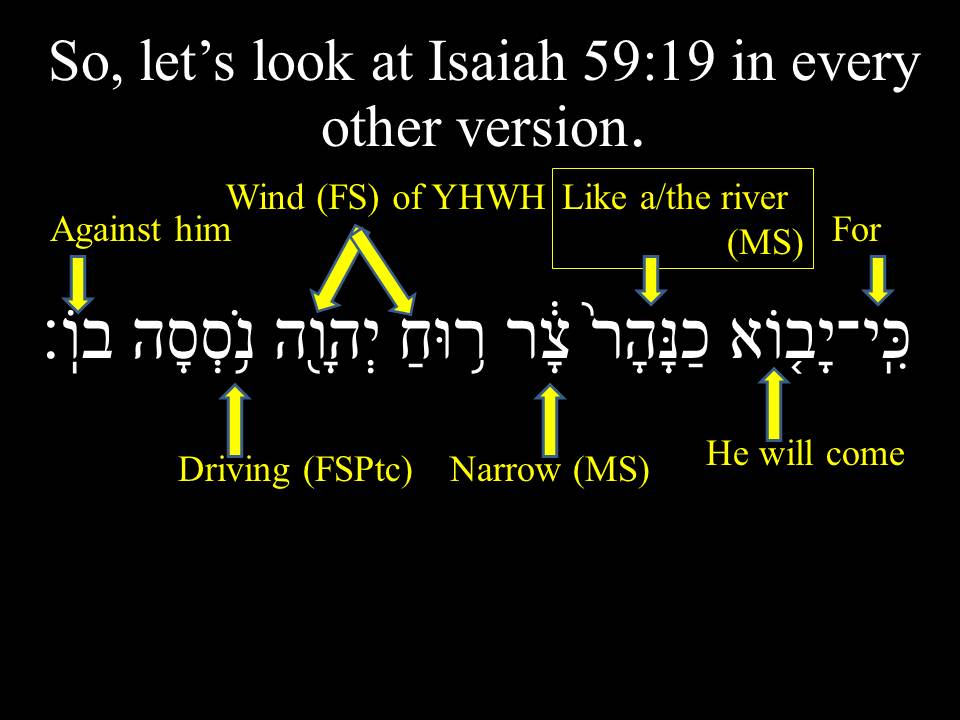In a recent post I began a discussion on the problems with the KJV’s translation of Isaiah 59:19, whose part of concern reads, “When the enemy shall come in like a flood, the Spirit of the LORD shall lift up a standard against him.”
We isolated three problems with this rendering stemming from what I believe to be a poorly determined antecedent to the pronoun in the verb “he will come.”
- The word that the KJV sets as the antecedent to this pronoun would be spelled incorrectly by the Hebrew Scribes if it is indeed supposed to be rendered “enemy.”
- The use of the article THE does not exist in the text. Rendering it THE enemy casts a different pall on the text… wrongfully suggesting SATAN to many modern readers.
- Making “The Enemy” the subject of the conditional clause forces the translators to give the term נֹ֥סְסָה nosesah (rendered in the KJV “will raise up a banner”) an unlikely meaning and an impossible form for that meaning.
These do not make this an impossible reading for the Hebrew in Isaiah 59:19, if one ignores the Hebrew Scribes who preserved these texts, but it does raise some serious issues, which, are not raised by the rendition favored in many other translations. These other translations also, as I will disclose in a future post, are far more likely given the larger context of this statement in Isaiah’s prophecy as a whole. For now, however, let’s just look at what they do with the Hebrew text as we received it from the Hebrew Scribes.
When we looked at the variety of translations given to Isaiah 59:19…
- NASB: “For He will come like a rushing stream which the wind of the Lord”
- NIV: “For he will come like a pent-up flood that the breathof the Lord drives along.”
- ASV: for he will come as a rushing stream, which the breath of Jehovah driveth.
- LXX: “for the wrath of the Lord shall come as a mighty river, it shall come with fury.”
- ESV: “for he will come like a rushing stream, which the wind of the LORD drives.”
- RV: “for he shall come as a rushing stream, which the breath of the LORD driveth.”
…the radical difference between them and the KJV forced us to imagine that they were looking at a different Hebrew text altogether, or that a radical collection of text critical disparities exist amid the many manuscripts containing this verse. Not so.
The only real difference, at least the difference that started the chain reaction that so radically altered the rendering, was in these translators assignation of the antecedent to the pronoun in “he will come” to YHWH, who is the subject of every clause since Isaiah 59:15 (If one embraces “His arm” as a designation for YHWH himself) and continues as such through Isaiah 59:21, where YHWH’s words take over.
So, in Figure #2, we see that most other translations have found the antecedent of the pronoun outside the verse, in YHWH Himself. Thus, the subject is left as the pronoun in the verb, “he will come.”
Next, we find a comparative phrase modified not with a misspelled noun (as KJV translators have rendered it) but with a properly spelled masculine single adjective or participle. (They are spelled the same.) The whole phrase comes out “like a narrowed river” i.e. like a whole bunch of rushing river water that has been funneled through a gorge becoming all the more violent and dangerous for it.
Next, we find an additional modifying phrase, “the Spirit/wind of YHWH driving against it.”
It is common in the ANE to use divine epitaphs to heighten one’s sense of a thing, like we do when we say something was “God-awful” or “simply divine.” Here, we have enhanced the sense of this river’s power. YHWH will not only come on the land like a narrowed river, but like a narrowed river with a mighty wind driving behind it.
This rendering of the term נֹ֥סְסָה nosesah as a feminine singular participle “driving” whose antecedent is spirit/wind is perfectly in keeping with its form and expected use.
In fact, the rendering “for he will come like a narrowed river with the wind of YHWH driving it” has only one small problem. It is this problem that likely led the KJV translators to opt for their reading, even though it is plagued with far more difficulty.
A TECHNICAL MOMENT COMING UP…
KJV translators over interpret an article (i.e. the) on “as a/the river,” preferring three other grammatical gymnastic moves in their own translation, to an easily explained, easily embraced abnormality in article use in the Hebrew Scribes rendition of the passage.
- In Hebrew, when you have an article on a noun, you are also expected to place an article on the adjective that modifies it.
- The text should normally read “The river the narrow” but we seem to have it reading “the river a narrow.”
- This is a general rule, but there are many places in Hebrew where the rule of article agreement between noun and adjective is not followed… especially when poetic rhythm is a concern. Poetry frequently bends grammar rules.
- In Hebrew when you add certain types of prepositions to a noun with an article, the consonant of the preposition replaces the consonant of the article, while the vowel of the article replaces the vowel of the preposition.
- This means that the evidence of the article in the Hebrew phrase כַנָּהָר֙ צָ֔ר is reduced to a dash the size of a few grains of salt under the first letter.
- Interestingly enough, the Greek texts of the LXX translate this passage without any article, reading “a river a violent,” which is the sense of a “narrowed river” in the first place.
So, what do we have? We have the KJV translation which has some fairly major issues entangling it, and we have a host of other translations confronting an uncomfortable, but not unknown anomaly with an article whose only presence is testified to by a dash the size of a few grains of sand.
For some, the biggest issue is whether or not they get to loudly quote their favorite promise from God in thwarting Satan’s every attempt to use the harsh realities of the world to bring them down.
The biggest issue for me, however, the subject of our next post, is which of these two passages seems most likely in the context of the prophecy as a whole.
Discover more from Biblical Literacy with Dr. Andrew D. Sargent
Subscribe to get the latest posts sent to your email.



